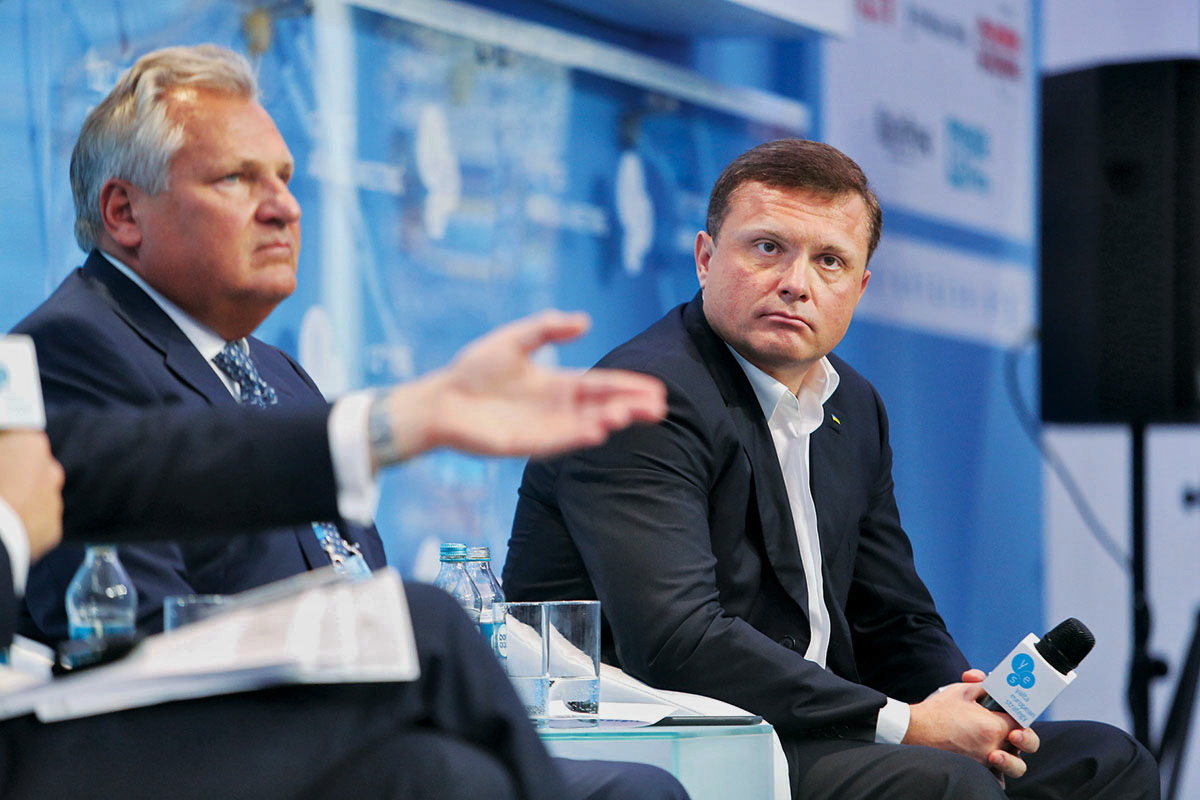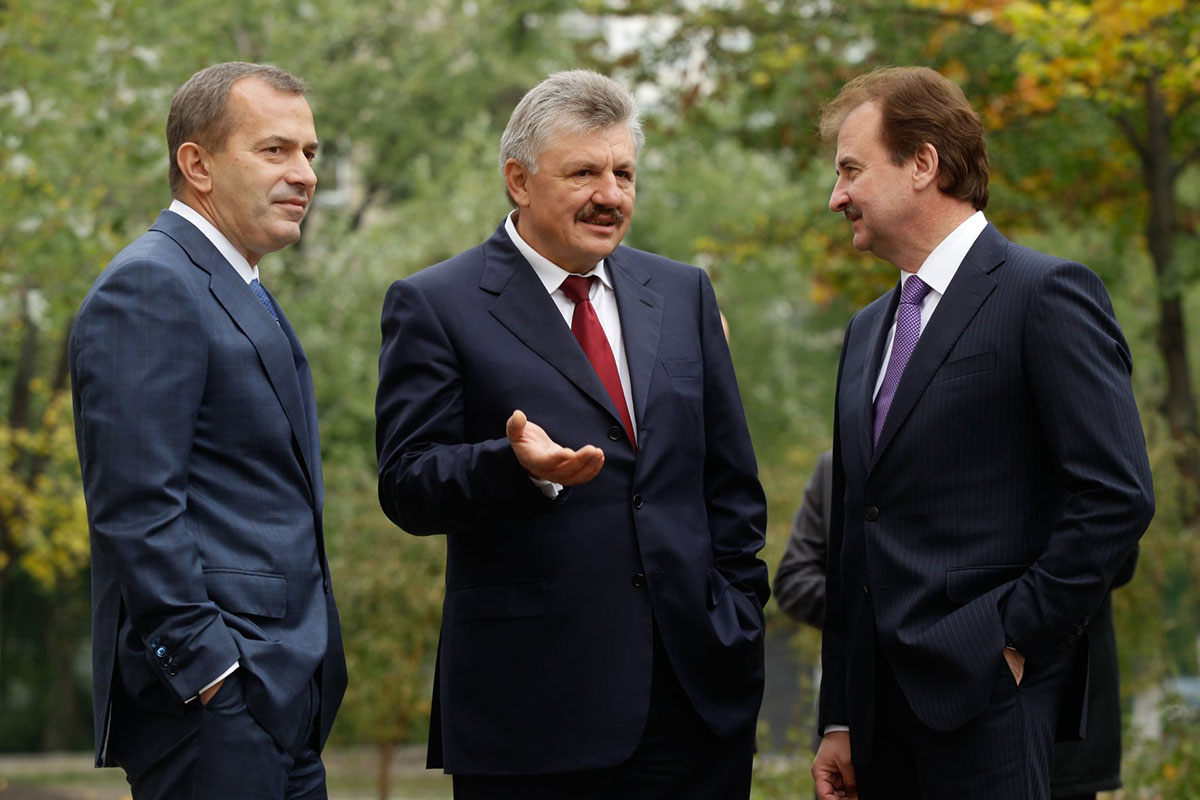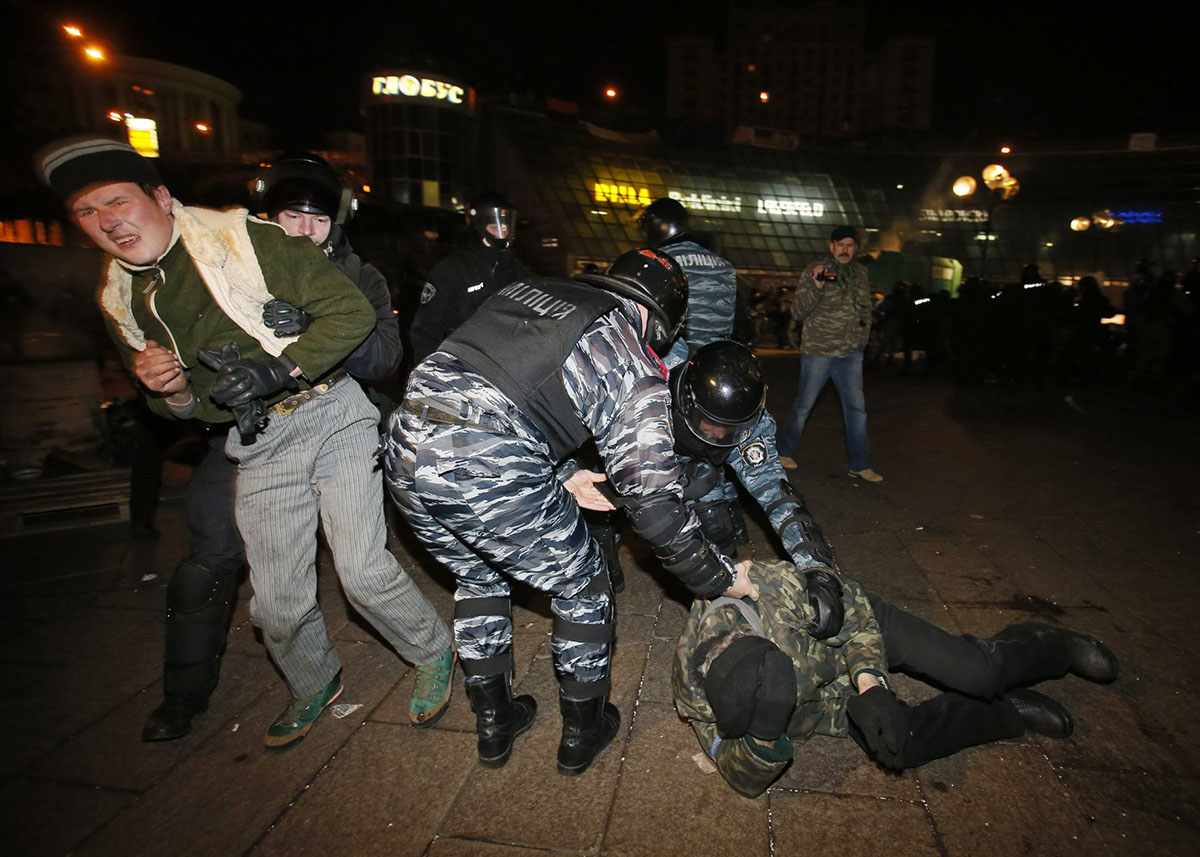For the first few months Paul Manafort worked in Ukraine, his home was a luxury hotel in downtown Donetsk – the Donbass Palace. There, on assignment for local tycoon Rinat Akhmetov in early 2005, Manafort would work from the room, reached by associates via the hotel telephone.
But when an Ukrainska Pravda reporter called through to his room, Manafort hung up, refusing to talk to the reporter, who later described him in a story as “famous for an indiscriminate assortment of clients.”
As history has since shown, by that time Manafort was already winding up his work with this broad “assortment of clients,” focusing instead on one. From then on, Manafort would work for the Party of Regions, burnishing the image of then-Prime Minister Viktor Yanukovych in Ukraine and in Western capitals while running errands for the party’s wealthy backers around the world.
Documents from the court cases that have dogged Manafort since then, and interviews with those who encountered him during this period, tell a markedly different story about his time in Ukraine than has previously been portrayed. He comes off as a man intimately acquainted with post-Soviet dealmaking, leading him to break the law in running an illegal pro-Western lobbying campaign to convince the European Union to sign an Association Agreement with Ukraine.
Manafort pitched the campaign to Yanukovych in practical terms — “to ensure that you never have to deal with a 2004 scenario again” — a reference to the Orange Revolution, which saw Yanukovych lose in a repeat second-round presidential vote to Viktor Yushchenko.
Manafort pleaded guilty to failing to register as a foreign agent in September after being convicted of tax and bank fraud in an August trial. He has agreed to cooperate with the investigation of Special Counsel Robert Mueller, appointed to investigate Russian meddling in the 2016 U.S. presidential election.
The big three
While court documents and trial testimony show that six Ukrainian oligarchs and public officials financed Manafort’s work, three people stand out as playing the biggest roles during his time in Ukraine.
They are Akhmetov, Yanukovych Presidential Administration Chief Serhiy Lovochkin, and billionaire gas trader Dmytro Firtash.
Each has his own distinct interests, shaped by their separate backgrounds.
Akhmetov
Akhmetov emerged from the bloody world of Donetsk in the 1990s as the billionaire head of System Capital Management — a steel and energy conglomerate spanning all of Ukraine, but with a focus in the country’s east.
With huge cash flows, Akhmetov began to invest in politics, supporting the candidacy of Viktor Yanukovych in the 2004 presidential election.
Yanukovych lost in a runoff election to Viktor Yushchenko, after mass voting fraud provoked protests known as the Orange Revolution.
It was in this tumult that Manafort first came to Ukraine, arriving in December 2004 ostensibly to work on a potential IPO for SCM.
But in a 2010 memo to Yanukovych, Manafort himself says that his work for SCM was a front.
“As we did in the early days, with SCM being my technical client while I, in fact, focused on your program, we would find another client (preferably not SCM since they have had this burden already), who would pay for my services under a multi-year contract,” Manafort wrote.
An Akhmetov spokesman denied the veracity of Manafort’s statement in the memo, saying that SCM had not worked with Manafort since 2005. Prosecutors accused Manafort in his first trial of operating undisclosed shell companies in Cyprus to receive money from his Ukrainian clients, supposedly on the advice of former deputy Prime Minister and Akhmetov ally Borys Kolesnikov.
Kolesnikov disputed the notion that Manafort would have needed help.
“So Paul Manafort, arriving in Ukraine after 80 election campaigns in 20 countries of the world, needed someone’s advice???” Kolesnikov wrote in a Facebook message.
“It’s as ridiculous as the black ledger,” he added, referring to the handwritten ledger of secret payments alleged to have been made by Yanukovych’s Party of Regions, found after the former president fled Ukraine.
Lovochkin
The vast majority of Manafort’s payments — in the order of around $40 million — ended up coming from Lovochkin, a tall, well-connected Kyivan who came out of the country’s political elite.
His father, Volodymyr, was a longtime official in Ukraine’s Interior Ministry. Volodymyr Lovochkin worked as director of the prison service’s punishment enforcement department at the same time that his son was scaling the Kyiv political ladder — a useful position in a world where Yanukovych, a convicted felon who served time in Soviet prisons, was playing a kingmaker role in Ukrainian politics.

Former Yanukovych Presidential Administration Chief Serhiy Lovochkin (R) looks on quizically at a panel at the 2015 YES Conference, seated next to former Polish President Aleksandr Kwasniewski. Lovochkin funnelled money into and Kwasniewski took part in a covert, international lobbying campaign to convince the European Union to overlook the imprisonment of former Prime Minister Yulia Tymoshenko and sign an Association Agreement with Ukraine. (Volodymyr Petrov)
The younger Lovochkin entered politics in the 1990s through the banking sector, before becoming an aide in the Kuchma government and an advisor to then-Donetsk Oblast Governor Yanukovych.
Lovochkin quickly earned himself a reputation as a dealmaker. According to Opposition Bloc Member of Parliament Nestor Shufrich, a former Party of Regions member, “in December 2004, and at the end of November, the ‘Orange’ protestors had access to Kuchma precisely through (Lovochkin).” The two sides “reached an agreement through Lovochkin,” he added.
By 2006, Lovochkin had become an official in Yanukovych’s Cabinet of Ministers, while the Ukrainian press began to link him with oligarch Firtash.
Firtash
From a small village in Ukraine’s west, Firtash began to pop up in the early 2000s as a businessman delivering gas from Turkmenistan while buying up fertilizer plants.
His empire metastasized throughout the decade, culminating in RosUkrEnergo: a middleman company formed to move gas from Russia, through Ukraine, to Western Europe that later dissolved amid accusations of mafia involvement and price inflation.
The RosUkrEnergo case drew the attention of the U.S. government, while Firtash continued to play a kingmaking role in the Party of Regions specifically, and in Ukrainian politics as a whole.
Firtash and Lovochkin control the Inter TV channel, one of Ukraine’s most influential media sources, and a useful tool for their political projects.
Narodniy Front Member of Parliament Serhiy Vysotsky told the Kyiv Post last month that Lovochkin would provide access to Firtash in exchange for financing.
“Lovochkin guaranteed entrance to the necessary offices… under Yanukovych or (Viktor) Yushchenko, and Firtash worked out the business schemes. And through the business schemes he bought influence, through Inter, the Party of Regions, and later the Opposition Bloc,” he said.
Turning to EU
Manafort worked with the above-mentioned three up through the 2010 presidential election, which saw Yanukovych beat Yulia Tymoshenko in a runoff.
In a meeting with U. S. Ambassador John Tefft in the runup to the election, Manafort purportedly said that he had “a double-digit lead” against Tymoshenko, who was “moving to discredit the election process as the only means of stopping Yanukovych.”
 After Yanukovych’s election, Manafort turned his sights on the government’s foreign outreach. In a memo to Yanukovych two weeks after his victory, Manafort laid out a strategy in which he would be the “manager” of “a plan to manage strategy, public relations and international affairs for President Yanukovych.”
After Yanukovych’s election, Manafort turned his sights on the government’s foreign outreach. In a memo to Yanukovych two weeks after his victory, Manafort laid out a strategy in which he would be the “manager” of “a plan to manage strategy, public relations and international affairs for President Yanukovych.”
The document calls for the government to “develop advocates within the diplomatic and political communities of Europe and the United States” in order “to ensure that you never have to deal with a 2004 scenario again.”
A big part of the campaign was managing Ukraine’s move towards signing an Association Agreement and trade agreement with the EU.
Caught by a mixture of geography, history, and politics between Russia and Europe, Ukraine would use the deal to edge towards EU accession and away from Kremlin influence.
Memos released by prosecutors after Manafort’s plea deal show him masterminding a covert lobbying campaign in favor of Ukraine taking a European path.
In one June 2012 memo to associates Konstantin Kilimnik, Rick Gates, and Alan Friedman, Manafort said it was necessary “to aggressively promote Ukraine’s compliance with (Western) demands and make the case that Ukraine is committed to building a democratic society.”
Officials working in Ukraine’s Ministry of Foreign Affairs at the time told the Kyiv Post that the government’s main priorities were tamping down criticism of the 2011 prosecution and imprisonment of Tymoshenko, vetting a new criminal code written by Presidential Administration aide Andriy Portnov, and portraying the 2012 parliamentary elections as free and fair.
“We should make the case that if the West is serious about helping to build a rule of law society, it should stop attacking Ukraine and begin to work with the government to train and assist in the implementation of the new laws,” Manafort wrote in the memo, adding that he intended “to assemble a small group of high-level European highly influencial (sic) champions and politically credible friends who can act informally and without any visible relationship to the Government of Ukraine.”
The campaign continued through 2013, with most of the financing coming from Lovochkin. A report in BNE Intellinews shows that Manafort flew around Europe for the campaign on Lovochkin’s aircraft.
By the time the November 2013 EU summit in Vilnius came around, Brussels was ready to ink the agreement. But Yanukovych, susceptible to buyouts, was not — he refused to sign the deal, sparking protests on Kyiv’s Maidan Nezalezhnosti Square.
The protests started small, with students huddled on Maidan. But in the early morning of Nov. 30, a Berkut unit brutally attacked the students, sparking huge demonstrations the next day which later snowballed into a revolution that took down Yanukovych.
It’s not clear who ordered the catalyzing attack on the students, but one theory — supported by Interior Minister Arsen Avakov and oligarch Ihor Kolomoisky — holds Lovochkin responsible for the attack.
Lovochkin denies the accusation, telling the Kyiv Post in a statement “let me remind you that I submitted my resignation because of President Yanukovych’s decision to refuse to sign the (free trade agreement with the EU) at the Eastern Partnership Summit in Vilnius in November 2013, and (because of) the use of force against peaceful protesters in Kyiv following it.” His press service said investigators had found no evidence of his involvement.
Investigations have focused on two officials who allegedly gave direct orders for the purge — one is Vladimir Sivkovych, a former KGB agent who worked with the Davis Manafort firm in Kyiv, and the other is then-Kyiv City Administration Chairman Oleksandr Popov.
In a leaked phone call with Bloc of Petro Poroshenko Member of Parliament Mustafa Nayyem, Kolomoisky called Popov “Lovochkin’s,” adding “I think there’s a question. Who owned Popov?”
Shufrich, the former Party of Regions member of parliament, said in December 2017 that “it couldn’t have happened without Lovochkin and Sivkovych.”
Concrete details of who ordered the attack — and whether Manafort had any role or knowledge of it — remain unknown. Those directly involved have scattered. Sivkovych fled to Russia in 2014, while Popov was fired over the beatings in December 2013, before being exonerated.
But an excerpt of hacked texts from Manafort’s daughters have lent more credence to the theory that the attack could have figured in a broader political campaign.
“To send those people out and get them slaughtered,” wrote one of Manafort’s daughters to the other. “Do you know whose strategy that was to cause that Revolts (sic) and whatnot?”
“As a tactic to outrage the world and get focus on Ukraine.”
She later called money her father had made in Ukraine, “blood money.”

National Security Council Secretary Andriy Klyuyev, former Vice Premier Vladimir Sivkovych, and Kyiv City Administration Chief Oleksandr Popov talk in Kyiv in October 2013. One month later, Sivkovych and Popov would stand accused of ordering a violent dispersal of student protestors on the morning of Nov. 30, 2013, in the early days of the EuroMaidan Revolution that ended Viktor Yanukovych’s presidency. (UNIAN) (UNAIN)
Cops on the take
Yulia Tymoshenko was sentenced to seven years in prison after Kyiv Judge Rodion Kireyev found her guilty of abusing her authority on Oct. 11, 2011.
The international community condemned the verdict, with observers at the time seeing it as a major step away from accepting the legal norms required for eventual EU accession.
Manafort sprang into action, bringing in prestigious U.S. law firm Skadden, Arps, Slate, Meagher, & Flom to write a report whitewashing the prosecution. Heading the team was a former White House Counsel to Barack Obama, Gregory Craig.
Manafort’s plea agreement reveals, however, that Skadden was involved much more deeply than was previously known, and that an unnamed oligarch financed many of the firm’s activities.
The firm “was retained to represent Ukraine itself, including in connection with the Tymoshenko case and to provide training to the trial team prosecuting Tymoshenko,” Manafort’s plea agreement reads.
A lawsuit filed by Tymoshenko against Firtash in New York City claimed that Firtash financed the Tymoshenko report. A judge dismissed the former Prime Minister’s case with prejudice, and Tymoshenko did not raise the claim elsewhere.
At the same time, Andriy Portnov was working on updating Ukraine’s criminal code from the 1962 Soviet version on which it was then based.
Ukrainian diplomats were faced with the task of convincing European bodies like the European Commission and the Parliamentary Assembly of the Council of Europe that the legal changes were legitimate and in line with European principles.
Manafort sent Portnov — who fled to Russia after EuroMaidan, before receiving residency in Austria — to Washington D. C. in February 2013. In a memo to Lovochkin about the visit, Manafort wrote “(the tone) was genuinely positive, open-minded, constructive, and did not focus on (Yulia Tymoshenko).”
Portnov continues to use his mastery of the country’s criminal code to defend Ukrainians from afar.
“He knows how to use the criminal code — he created it,” said Kyiv political analyst Volodymyr Fesenko.

Members of the Berkut attack and arrest student protesters on the morning of Nov. 30, 2013. The violent crackdown helped catalyze huge protests that eventually brought down ex-President Viktor Yanukovych (UNIAN)
The enablers
None of this — neither Manafort’s mass movement of undeclared cash into the United States nor the lobbying campaign to legitimize Yanukovych — would have been possible without the help of rich, politically connected Westerners.
The Hapsburg Group was conceived specifically to wield the influence that such people — in this case former Polish President Aleksandr Kwasniewski, former Austrian Chancellor Alfred Gusenbauer, and former Italian Prime Minister Romano Prodi — could provide.
A section of one February 2013 memo to Yanukovych — entitled “back-channel diplomacy” — describes the Hapsburg Group’s efforts to “finalize the (EU Association) agreement.”
Manafort wrote in the memo that the Hapsburg strategy had been successful in dispelling concerns over Tymoshenko’s prosecution and other issues, because “the participants are significant European leaders who are viewed as objective regarding Ukraine. This has allowed them to make their points without any apparent self-interest, thus giving their comments more weight and impact.”
On the U.S. side, Skadden’s Greg Craig is under investigation for failing to register as a foreign agent as part of his engagement, U.S. media reports indicate.
He left the law firm in April 2018 amid the investigation. Skadden refunded the Ukrainian government $567,000 in June 2017 over payment issues from the $4 million report.
Craig was warned by people he interacted with at the time that the case could turn out to be a problem.
“I told Craig: ‘this is a corrupted case!’” Tymoshenko attorney Serhiy Vlasenko told the Kyiv Post in August 2016.
That month, Manafort would resign from the Trump campaign amid reports that $12.7 million was earmarked for him from the Party of Regions’s “black ledger.” Two years later, he was convicted on tax and bank fraud charges.
This article has been updated to reflect that a lawsuit against Dmytro Firtash was dismissed.
